| Srl | Item |
| 1 |
ID:
084467
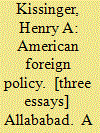

|
|
|
|
|
| Publication |
Allababad, A H Wheeler, 1969.
|
| Description |
143p.
|
|
|
|
|
|
|
|
|
|
|
|
Copies: C:1/I:0,R:0,Q:0
Circulation
| Accession# | Call# | Current Location | Status | Policy | Location |
| 015550 | 320.673/KIS 015550 | Main | On Shelf | General | |
|
|
|
|
| 2 |
ID:
096866
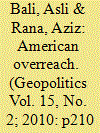

|
|
|
|
|
| Publication |
2010.
|
| Summary/Abstract |
This article argues that American actions in the Middle East designed to advance democracy and/or 'moderation' tend to yield perverse outcomes that frustrate the aspirations of local actors while undermining the values purportedly being promoted by the US. In order to explain these contradictions, we emphasise the linkage between policies of democracy promotion and long-standing American commitments both to millennialism and geographical omnipresence. As a result of these policies and geopolitical vision, we argue that 'democracy promotion' often devolves into a simple defence of American interest - by producing electoral outcomes intended to strengthen local agents seen as compliant with US regional priorities. In this context, the shift from democracy promotion to a policy of pursuing 'moderation' in the region, understood as support for American policies, is entirely coherent. Commentators tend to present this shift (particularly in the wake of the Iraq War) as recognition by US political actors of the imperial overtones embedded in more heavy-handed approaches to regime change. Yet, the call for moderation is itself profoundly intertwined with American millennial aspirations, while remaining remarkably devoid of clear content and thus equally amenable to manipulation for strategic ends. By way of conclusion, we suggest an alternative basis for a less intrusive American position in the region, one that rejects the need for an overstretched territorial presence and that is grounded in a substantive respect for local self-determination.
|
|
|
|
|
|
|
|
|
|
|
|
|
|
|
|
| 3 |
ID:
101232
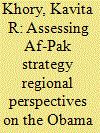

|
|
|
| 4 |
ID:
085131
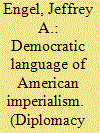

|
|
|
|
|
| Publication |
2008.
|
| Summary/Abstract |
Theodore Roosevelt's conception of order and progress within the international system can be discovered through a close analysis of his letters, speeches, and statements to Congress. Like so many of his age, he believed a social contract bound governments to provide for the welfare of their people. Governments which failed at this charge discarded their legitimacy, and could thus be overthrown by more civilized great powers, such as the United States. This worldview is revealed through his thoughts preceding the Spanish-American War of 1898, during the Panama Canal crisis of his presidency, and then finally in the way he blamed Kaiser Wilhelm and his ruling clique for instigating World War One, separating the Kaiser's government from well-meaning German citizens. This language and worldview laid the foundation for more profound changes in American foreign policy to come, in particular the transformative diplomacy of Woodrow Wilson.
|
|
|
|
|
|
|
|
|
|
|
|
|
|
|
|
| 5 |
ID:
085137
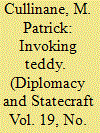

|
|
|
|
|
| Publication |
2008.
|
| Summary/Abstract |
Since John McCain's first aspirations for the presidency became public in 1999, he has often indicated his affinity for Theodore Roosevelt as his role model. Though McCain is not alone in admiring Roosevelt, his 2008 bid for the White House offers an opportunity to observe Roosevelt's legacy, and particularly how that legacy has impacted foreign policy thinking. The central argument of this article is that John McCain's impression of Roosevelt is as a composite of realist and idealist standpoints. This perception of Roosevelt is outlined in McCain's own publications and in his advocacy for foreign policy as a representative, senator, and presidential contender in both 2000 and 2008. John McCain's own style of statecraft is also conducted in full recognition of the legacy of Theodore Roosevelt
|
|
|
|
|
|
|
|
|
|
|
|
|
|
|
|
| 6 |
ID:
098263
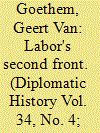

|
|
|
| 7 |
ID:
171008
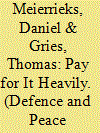

|
|
|
|
|
| Summary/Abstract |
After the 9/11 attacks in particular, there has been a controversial discussion in the academic and public arena on whether the United States’ close relationship with Israel has made it a likelier target of transnational terrorism. Indeed, foreign terrorist organizations with various ideological profiles have repeatedly justified attacks against U.S. interests as punishment for the (purported) special relationship between the United States and Israel. We analyze the effect of various measures of U.S. support for Israel (e.g. U.S. military assistance to Israel) on anti-American terrorism for the period 1970–2014. Using both time-series and panel approaches, we do not find that more U.S. support for Israel systematically translates into more anti-American terrorism. Rather, other systemic (e.g. U.S. dominance in the international system) and local conditions (e.g. local state failure) are found to predict the patterns of anti-American terrorism. However, as a qualification to these general findings, we also provide some (preliminary) evidence that for terrorism originating from the Middle East and Northern Africa a favorable U.S. policy stance towards Israel may indeed contribute to more anti-American terrorism.
|
|
|
|
|
|
|
|
|
|
|
|
|
|
|
|
| 8 |
ID:
095037
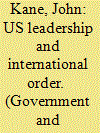

|
|
|
| 9 |
ID:
163356
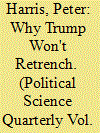

|
|
|
|
|
| Summary/Abstract |
AT THE TIME OF HIS INAUGURATION, it appeared plausible that President Donald J. Trump would deliver the most dramatic shifts in U.S. foreign relations at least since the September 11 terror attacks, probably since the end of the Cold War, and perhaps even—in some important respects—since World War II. As a candidate for office, after all, Trump had made no secret of his disdain for the organizing principles of U.S. foreign policy. He took particular aim at the great edifice of U.S. internationalism, styling himself as an unapologetic nationalist whose “America First” approach to foreign affairs compared favorably with the perfidious “globalism” of his political opponents.
|
|
|
|
|
|
|
|
|
|
|
|
|
|
|
|